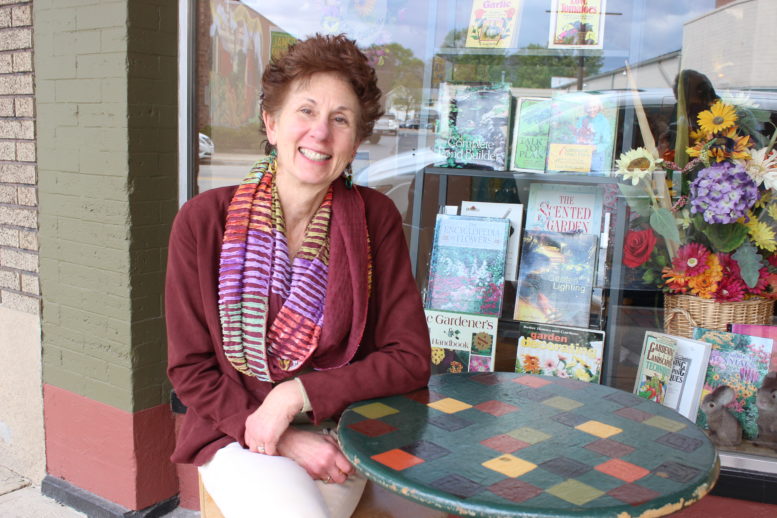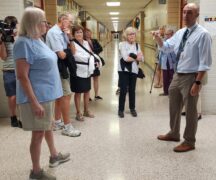By DAVID DUPONT
BG Independent News
Matt Webb knew of Jo Beth Gonzalez’s teaching mostly through his daughters’ experience in theater at Bowling Green High School.
Katie is a high school junior who is in the improv troupe and in one acts, and the other, Liz, is a college junior who danced in the musicals. As students involved in theater they worked closely with Dr. G, who has taught theater at the school for 22 years. Neither girl, their father said, is a star, but both felt the drama teacher had a positive influence on them. His younger daughter told him that Dr. G was always preparing them for life.
So when, in his role as the director of student and academic services in the Bowling Green State University College of Education and Human Development, Webb received an email asking for nominations for the college’s Educator of the Year award, he decided to submit her name.
First he reached out to Gonzalez and asked for her curriculum vitae. He learned the details, about the ground-breaking productions, the award-winning shows, two books. “I realized how stellar she is.”
This week Gonzalez received the honor given to outstanding alumni and gave the keynote address to about 350 graduates of the college during their Capstone Day activities.
As nominee, Gonzalez had to go through an interview process, almost like getting hired for a job. “It was a little nerve wracking,” she said in a recent interview. And she had to respond to a question, she hadn’t prepared for: What is the greatest challenge facing the nation and how does she address it in her work?
The problem: The disparity in the quality of education people receive depending on where people live. Her solution: “We need to teach or social equity and social justice… that there’s injustice in all facets of our country.”
She continued: “I teach in a way that alters the power structure. So I’m not the power center.” She makes her classes student centered in order “to teach students to collaboratively make decisions.”
In productions, she said, that means bucking the star system and making “the ensemble completely integral to the work,” even in musicals.
It also means, Gonzalez said, making sure students understand that some people have more privilege than others. She starts with herself. Being up front that being a white, middle class, able-bodied, heterosexual gives her an advantage in life.
“I feel students who are marginalized appreciate somebody recognizing their own privilege,” she said. “Other kids, it makes them think. … We don’t do that enough.”
Not that there isn’t resistance. In a public speaking class, one student argued against the concept of white privilege and said that society is too concerned with matters of social justice.
“I think it’s important,” Gonzalez said, “for kids to be able to express their opinions. … I’m not going to censor them.” They do need to support them and express them well, she said. That makes them examine what they believe more closely.
After being named the BGSU Educator of the Year, she had homework, preparing the Capstone Day keynote address.
In that talk, she reflected on her own path. She attended BGSU as an undergraduate because it was a distance from her home in northeast Ohio. She didn’t set out to be a teacher, indeed that prospect was “an anathema to me.” But “practicality overruled my passion for the life of a starving artist” and she became an education major. Al Gonzalez, the man who she met here and would become her husband, helped guide her to that decision, she said. Gonzalez started teaching in a small rural school. When her husband returned to take a job teaching at the university, she commenced her doctoral studies at BGSU, having received an MFA in directing from the University of Minnesota.
When she took the job teaching drama at Bowling Green High School, she had reservations. She didn’t expect to last more than three years; she ended up staying for 22 despite having no true theater for most of her time here. Instead shows were produced in a decrepit auditorium and on a series of “temporary stages.” “Temporary Stages” became the main title and theme of her first two books.
Gonzalez told the students that they should be willing to take on controversial topics—through Social Issues Theatre students have addressed the issues of depression, teen suicide and sex trafficking. But they should also be aware of the social context. “Navigate these waters carefully,” she told the education graduates. Reflecting on her working relationship with Jeff Dever, principal of the high school, she told them: “Try to find a way to make your principal’s job easier.”
The honor comes with a monetary award. Gonzalez will travel to South Korea this summer with her husband, and hopes to use that money to study how theater is taught there.
She’s at work on a third book. “The more that I teach, the more that I see theater as a way for students to develop a sense of self through self-expression. When students are able to create, they get to know themselves better.” Through theater, students learn about others, and yet they also experience “moments of great introspection.”
“Certainly we honor and celebrate the growth of their inner selves, that’s what theater does.”
Gonzalez wants to explore this further and “study the links between spirituality and theater.” This relates to neuroscience and brain development. “It’s about finding connectedness, finding stillness, and understanding who we are.”





